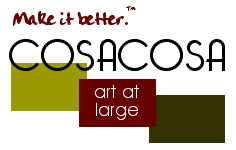



Out on the blacktop the kids run, joke and talk, play catch, hopscotch, Double Dutch, and tag. I wonder about the inner life and dreams of these children, my students. What are their aspirations, and do they believe in them strongly enough to realize them? What kind of support do kids need to envision and achieve a positive future? And what kind of sustenance do all of us need to know and trust our dreams as we grow up and move into our adult lives?
Throughout my years teaching creative arts to children, I have had innumerable inspiring encounters with young artists. A ten-year-old girl who loved art was delighted to discover that I, too, was an artist. A middle school student found solace in expressing social pressures through dance. A shy, self-conscious high school student blossomed as an actress and videographer. A paralyzed sixth grader created a pointillist masterpiece by gripping a rounded brush in his fist. A preteen two years older than her classmates finally understood basic math concepts through planning a mosaic. With determination and joy in the work they accomplished, each of these young people exhibited a dynamic peace -- the peace of mind that comes with knowing what you want and believing you can make it possible.
When I think about my interactions with these students, I feel energized in my own quest to know and believe in myself and to encourage others to do the same. Most of my friends are creative professionals of some type or another -- dancers, musicians, poets, theater directors, activists, educators. Our work has deep value, yet many of us struggle to combat negative stereotypes like "starving artist" or "dilettante.” Undermining messages can stand in the way of people finding clarity and committing to their principles.
As I watch the children play behind this North Philadelphia school, I understand the importance of the arts as an empowering force for our lives. It is good that we tell children to "believe in their dreams," and ask them "what they want to be when they grow up," but we must also work to embody this determination in order for the lesson to have a more powerful and lasting effect. The arts teach us a necessary resiliency – the creativity to overcome obstacles and the inspiration to strive for success.
It is crucial that we support each other -- all people -- in finding and following our dreams for our lives and for our communities. We need to filter out negative ways of thinking so that we can see our ideals more clearly and envision transformative ways of living in the world. As we find the dynamic, determined peace of knowing ourselves and our creative power, our opportunities expand. For all of us out here on the blacktop, the possibilities are endless.
Lee Fogel is a Somatic Movement practitioner and contemplative artist based here in Philadelphia. She co-founder of the Philly Contact Collective, a collaborative improvisational dance company, and she teaches and performs in various community settings, including as a resident artist with COSACOSA.
Artolatry bread image after Salvadore Dalí's Basket of Bread (1926).